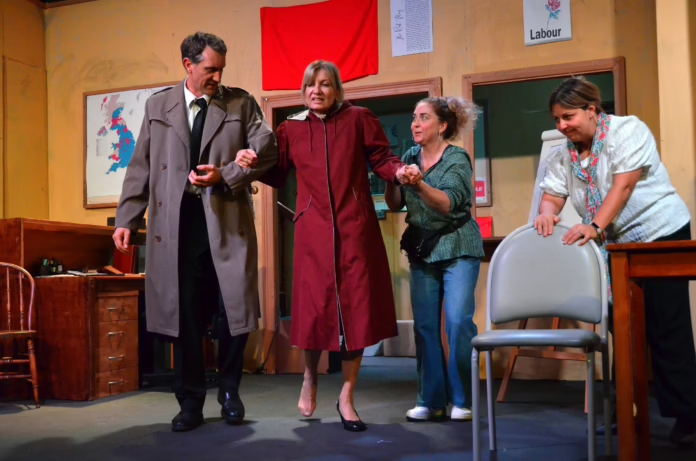This is a worthy play and worth seeing. Director Kym Clayton and his cast navigate their way through a fascinating, yet potentially tricky, script structure with confidence and purpose, and make the timeline perfectly clear.
The premise is clear. The play is set in a Blairite Labour MP’s Nottinghamshire electorate office and loops backwards (Act 1) then forwards (Act 2) through various elections and events over 27 years, beginning and ending in 2017. Each scene takes us to a particular election or event. Central to both Acts is the conflict between Old and New Labour: the red flag bearing Old vs the red rose wielding New. Although there are significant other characters involved, the principal loads in examining this tension are borne by David Lyons, the MP, and his office manager Jean Whittaker. Their receding, then evolving, interaction is complex and fascinating.
The narrative line is well defined by a series of screened images of photos and newsreel footage of the significant political events of each stopping point. That’s helpful. You don’t have to be schooled up on British Labour politics to follow the plot and appreciate the points the playwright James Graham is putting to us. That said, some of the wittier barbs take a deeper, more satisfying, meaning for those who are au fait with that era.
In this production Stephen Bills as the MP and Lana Adamuszek as the electorate office manager did a remarkable job in their enormous roles. Their often fraught relationship, full of personal and political differences, was the centrepiece of the play, and they sustained it admirably. Bills presented us with a committed “new broom” attitude to reforming the Party and using his role as an MP to achieve good things for the electorate by breaking away from the leftist path. Despite that commitment, Bills showed his character to have a decided vulnerability, occasional awkwardness and woodenness when dealing with the old guard, represented by Jean, and the local Party chairman, Len, gruffly and convincingly played by Larry Waller. For the most part he was the straight man, an image only broken once by an unexpected outburst of song and dance. Adamuszek was strong, strident and at times funny as the no-nonsense Jean, firmly embedded in the ways of Old Labour. Yet she succeeded in the very demanding task of showing subtle changes in her political attitudes and the relationship with David – in reverse and, later, in a forward direction. While at times some of her more cutting, gloriously-accented, provincial English lines didn’t get the audience response I would have expected, especially in Act 1, the strength of her character’s opinions and style were perfectly clear. The audience reacted more in the second Act, as we warmed more to Jean and, indeed, the other characters.
Regarding the play’s structure, Act 2, was stronger, both in content and delivery. It was then that the unanswered questions raised in the various Act 1 scenes were carefully resolved and explained by the playwright and the performers.
Anita Zamberlan Canala was consistently forceful as the uncompromisingly unpleasant Elizabeth, David’s wife, who was opposed from the start to having to be based away from London. Zamberlan Canala made the most of her role, with good dramatic timing and well-delivered barbs, while stoically surviving the witty attacks, particularly from Jean.
The production is well served by a typically detailed and authentically presented set by Don Oakley. It’s a run-down office which, despite the passing of the years, does not change, nor does it need to. In a way, that’s the point.



